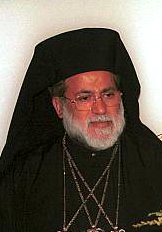Patriarch Peter VII of Alexandria facts for kids
Petros VII (born September 3, 1949 – died September 11, 2004) was an important leader of the Greek Orthodox Church in Africa. He was known as the Pope and Patriarch of Alexandria and all Africa from 1997 until his death in 2004.
During his time as leader, Petros VII helped the Greek Orthodox churches in Africa grow. He is remembered for increasing the number of people attending these churches to about 250,000.
Contents
Early Life and Education
Petros's Childhood
Petros was born on September 3, 1949, in a place called Sichari in Cyprus. His birth name was Petros Papapetrou. He was the oldest son in his family. Both his father and grandfather were priests in the Greek Orthodox Church.
School Days
When Petros was 12 years old, he started studying at the Machairas Monastery. Later, at age 17, he went to the Apostle Barnabas Seminary in Nicosia. He finished his studies there in 1969. After that, he became a deacon at the Machairas Monastery. A deacon is a helper in the church.
Further Studies
In 1970, Petros was asked to come to Alexandria by Patriarch Nicholas VI. A Patriarch is a very high-ranking church leader. Petros worked as a deacon under Nicholas VI while also studying at Averof High Schools. In 1974, he received a special scholarship. This scholarship allowed him to study theology at Athens University in Greece.
Work in the Church
Serving in Africa
After finishing university in 1978, Petros became a priest. He then moved to Cairo, Egypt. There, he was given the title of Patriarchal Vicar. This meant he was a special helper to the Patriarch. In 1983, he became the Bishop of Babylon.
Petros worked in many different places across Africa. He served in cities like Johannesburg, Accra, and in countries like Cameroon. He also worked in Central East Africa. While in Africa, Petros focused on fixing old monasteries. He also worked to spread the Christian message in East Africa.
Leading the Church
Petros became the Patriarch of Alexandria on March 9, 1997. He was chosen for this important role by the Holy Synod in February 1997. The Holy Synod is a group of senior bishops. Petros had a good relationship with the previous Patriarch, Patriarch Parthenius III of Alexandria. He took over after Parthenius III passed away in 1996.
During his time as Patriarch, Petros worked to build strong connections with other church groups. He also talked with religious communities outside the Greek Orthodox Church. Petros also tried to create peaceful relationships between Muslims and Christians in the Middle East. He even met with Arab leaders, including Yasser Arafat. Petros led the Patriarchate of Alexandria for seven years.
Spreading the Message
Petros used his position as Patriarch to connect Orthodox groups around the world. He wanted to "spread the voice of Orthodoxy throughout Africa." He especially wanted to reach people who had never heard about Christ. He also cared about people suffering from hunger and sickness, and those without schools.
In 2002, Petros wrote a letter to then-US President George W. Bush. He hoped to stop the Iraq War. In his letter, Petros explained that invading Iraq could be seen as an attack on Islam. He warned that it could cause problems for other religions in the future.
Death
Petros VII died on September 11, 2004. He was in a helicopter crash that killed 17 people. Three other bishops from the Church of Alexandria also died in the crash. The Boeing Chinook helicopter crashed into the Aegean Sea. They were traveling to the monasteries of Mount Athos.
The government announced three days of national mourning after the accident. Petros VII was honored with several awards during his life, including the Order of the Yugoslav Crown and the Order of Saint Sava.
 | Janet Taylor Pickett |
 | Synthia Saint James |
 | Howardena Pindell |
 | Faith Ringgold |


